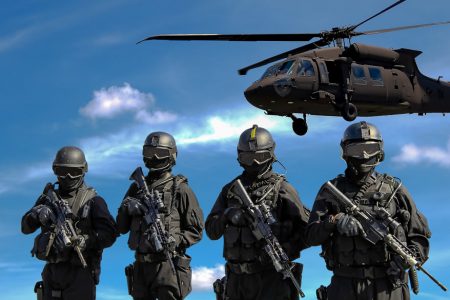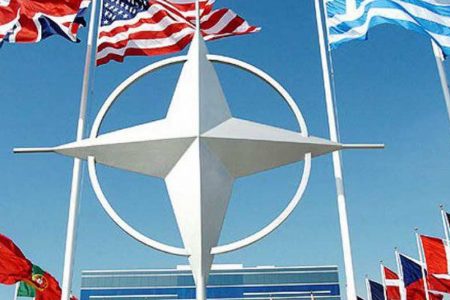President-elect Donald Trump certainly is relying heavily on retired senior generals. Four four stars – Marine Generals James N. Mattis who will be announced today as Secretary of Defense and John Kelly and Army Generals David Petraeus and Jack Keane as well as Lieutenant General Mike Flynn, the next National Security Advisor – have been at stage center. And it is rumored that Admiral Mike Rogers, currently head of both the National Security Agency and Cyber Command could also be nominated for an important post.
Why? The cute but wrong answer will be seen as a case of generals’ envy. After all, the president-elect graduated from the New York Military Academy (before matriculating to the University of Pennsylvania) where no doubt the rank of general was regarded in reverential terms. Critics will suggest that this experience has shaped his preference for generals.
There is however, a much better and more accurate reason. Across America, too many institutions have been de-legitimatized and demeaned. Congress has a single digit favorability rating. So too have the media, the Boy Scouts, the legal profession, many universities and the Catholic Church been targets of public opprobrium. One institution that remains highly regarded is the U.S. military.
Despite the political failures to impose democracy on Iraq and Afghanistan, the American military has steadfastly carried out its tasks with great professionalism under the most difficult circumstances. The public has recognized the dedication of men and women in uniform with its high approval. And much of the credit is due to the senior leadership—the generals and admirals in charge.
Jim Mattis is uniformly recognized as a general’s general. So too has David Petraeus admirably served his country despite an unfortunate liaison that forced his resignation as CIA Director. Jack Keane, a Vietnam veteran awarded a Silver Star for valor in that conflict, is widely respected and admired. John Kelly likewise is held in high regard.
The argument however against making any retired general Secretary of Defense is the issue of civilian control over the military. That is a fair case. The issue is whether the particular flag officer can make the transition from a military background to political appointee. George C. Marshall and Colin Powell did. Alexander Haig, former NATO commander in Europe, did not and was replaced as Ronald Reagan’s Secretary of State.
Knowing Jim Mattis, he has the breadth of experience, the intellectual capacity, the independence of mind to tell it as it is and self-discipline to make this transformation. Furthermore, it is clear that the president-elect has great respect for General Mattis. The brief exchange over waterboarding during Mattis’ interview at Bedminster, New Jersey several weeks ago seemed to change Mr. Trump’s view on torture. He reported to the media that the Marine general did not believe waterboarding worked and told the president-elect that he could do better with a pack of cigarettes and several cans of beer. This is very important because, in the past, Mr. Trump too often made pronouncements that were at best uninformed.
Unfortunately, in his enthusiasm to spill the beans on this appointment, Mr. Trump likened General Mattis to General George Patton of World War II notoriety, “old blood and guts,” our blood his guts many of his soldiers complained. Patton gained prominence in the North Africa and Sicily campaigns against the German Wehrmacht and was often more concerned with advancing his persona than the safety of his soldiers.
He was nearly fired for famously slapping a soldier who was suffering from post-traumatic stress disorder known then as battle fatigue, accusing the poor man of cowardice. General and later President Dwight Eisenhower, Patton’s boss ordered “blood and guts” to apologize to his troops. Not given a command in the Normandy invasion of June 6th, 1944, Patton was assigned to lead the fictitious First US Army Group (FUSAG), a deception designed to convince the German High Command that Calais was the intended invasion point for the allies re-entry into Europe.
Eventually Patton was given the U.S. Third Army that helped relieve the German siege around Bastogne during the Battle of the Bulge in December 1944. After the war, Patton made foolish remarks comparing the Nazi and American political parties that was his downfall. Shortly after being relieved for the last time, Patton was killed in a bizarre car accident near hs headquarters.
Patton was General Mattis is no Patton and thank goodness. The last thing Mattis would do is to slap a soldier or a marine. He also leads from the front. He is both cerebral and audacious. However, he would never spill a drop of Marine blood unless it was absolutely necessary and then with great regret. Unlike Patton, Mattis can control his ego.
Could this go wrong? The answer is unknowable. Chairman of the Joint Chiefs of Staff is Marine General Joe Dunford. Dunford was one of Mattis’ regimental commanders in the First Marine Division that made the remarkable march north to Baghdad in March 2003 during that war – one of the greatest tactical victories in history. So the relationship between the secretary and chairman is bonded in war.
That relationship has advantages and disadvantages, namely that this mutual loyalty could be questioned by those who would see civilian control of the military being eroded. National Security Advisor Lieutenant General Flynn has reportedly complained that he did not want a retired four star general in competition. That could prove to be the real general’s envy and a lurking issue.
I have been highly critical of certain of the presidential-elect’s national security statements and promises. But this is a great appointment. Bravo Trump and bravo Mattis.




